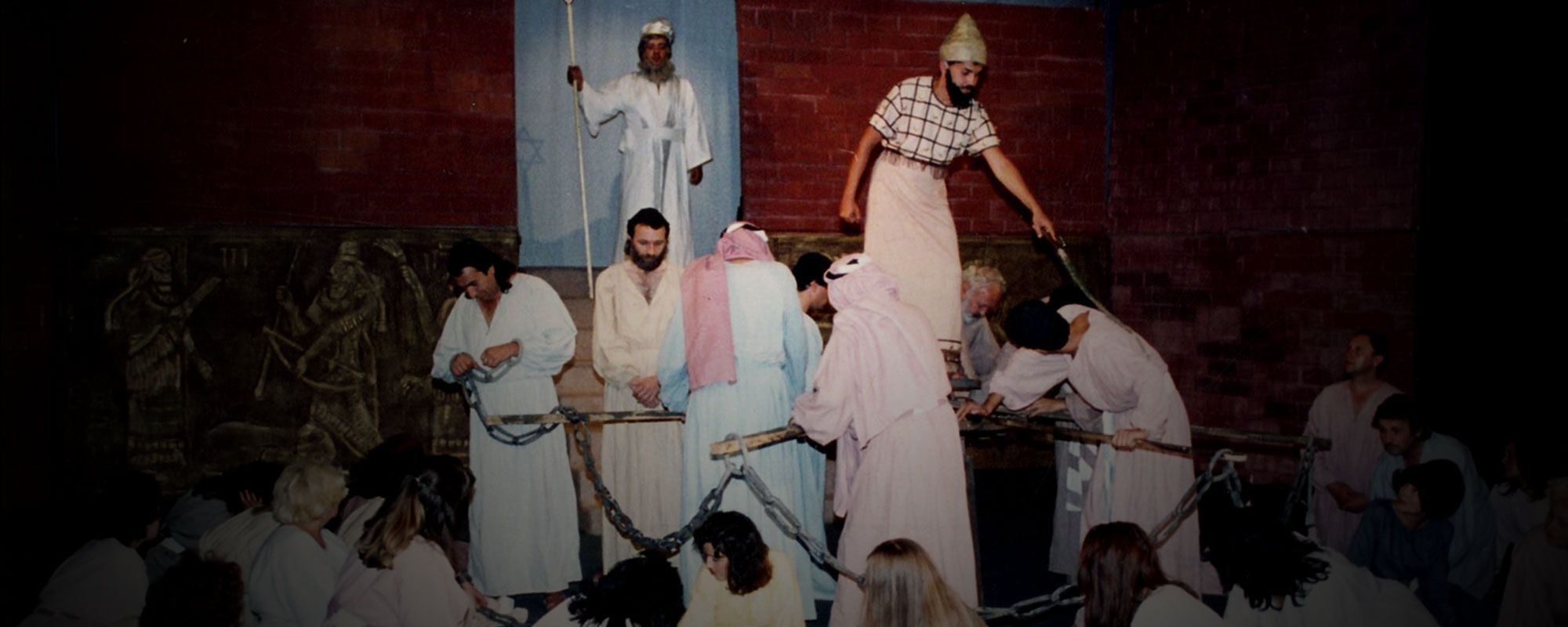Nabucco
Giuseppe Verdi
- World premiere
- Teatro alla Scala din Milano, 9 martie 1842
- Romanian Opera Craiova Premiere
- 18 decembrie 2002
- Time Length
- aprox. 3h – două pauze
- Extra info
- Spectacol în limba italiană cu supratitrare în limba română
Opera in three acts composed by Giuseppe Verdi.
Libretto by Temistocle Solera.
The action takes place in Jerusalem and old Babylon.
ACT I
The curtain rises revealing the Temple of Solomon of Jerusalem, where the Israelites mourn the conquest of Jerusalem by Babylonians. The prophet Zaccaria enters with Fenena, Nabucco’s daughter, whom the Israelites have managed to take as a hostage. He entrusts Fenena to a young Israelite officer, Ismaele. After Zaccaria and the Israelites leave, we find out that the two young people are in love and that Ismaele, as he was a prisoner in Babylon, had escaped with the help of Fenena, even though her sister, Abigaille, was in love with him as well. As Ismaele intends to free Fenena, Abigaille has an impressive entrance to the temple, leading an army of Babylonians. In the following trio, Abigaille guarantees that Ismaele would live, asking for his love instead. Of course, he refuses. Nabucco arrives at that moment, in the sounds of a march. Zaccaria threatens to sacrifice Fenena and raises the dagger. In the scene finale, Nabucco orders the soldiers to burn the temple down.
We are now in Babylon, where the Israelites remaining alive have been deported to slavery and imprisonment. We are seeing the gardens of Abigaille. She finds a parchment that shows she is not Nabucco’s daughter, only a slave he had adopted.
ACT II
The prophet Zaccaria is praying. God has inspired him to convert Fenena to the Judaic faith. In the meanwhile, the false death of Nabucco is announced. Abigaille claims the crown from Fenena, who had been appointed regent by the king, before he had left. Nabucco’s unexpected return will complicate the situation. Considering himself betrayed by his own family and by the people, he curses the gods and self-proclaims himself the only “God of the Universe”. Everything culminates with a crash of thunder: it is Jehovah’s thunder that makes Nabucco’s crown fall off his forehead. He becomes crazy. “The sky has punished the vain”, says Zaccaria. Abigaille grabs the crown and places it on her head: “The splendour of the people of Baal shall never be extinguished”, she says as the curtain goes down.
The following scene takes place in the famous Hanging Gardens of Babylon. Abigaille is reigning. The high Priest of Baal presents her with the death warrant of the Israelites. Nabucco comes in, pale. A duet follows, where Abigaille manages to convince the insane king to sign the warrant. As he asks for Fenena, his legitimate daughter, Abigaille informs him that, since she had converted to Judaism, she will die with the other Israelites. She then has the guards arrest Nabucco. The Israelites mourn their conquered country and express their fervent wish for freedom, singing the famous choir (Va pensiero – Fly thought on golden wings). Zaccaria comes and encourages them with a prophecy of victory: the lion of Juda shall triumph over the destroyed Babylon.
ACT III
Nabucco is again lucid. He recognizes Jehovah as God, asking for his promise to rebuild the Temple of Sion.
The last scene begins with a funeral march accompanying Fenena’s sentence. Priest Zaccaria is alongside her. In a short prayer, the girl entrusts herself to Jehovah. Then Nabucco appears sword in hand, surrounded by his loyal people. He orders the soldiers to take the idol of Baal down. A celebration hymn precedes Abigaille’s entrance. She has poisoned herself and comes to beg for forgiveness for her crimes. In the finale, Zaccaria celebrates Nabucco, the King of Kings.
*Grigore Constantinescu & Daniela Caraman-Fotea, Ghid de operă, Bucharest, 1971
**Ana Buga & Cristina Maria Sârbu, 4 secole de teatru muzical, Bucharest, 1999
***Ioana Ștefănescu, O istorie a muzicii universale, Vol. IV, Bucharest, 2002

